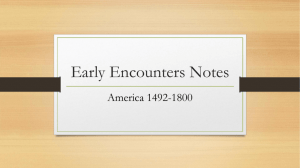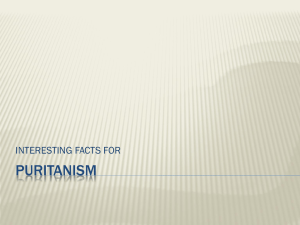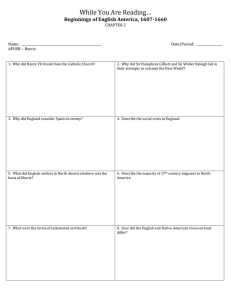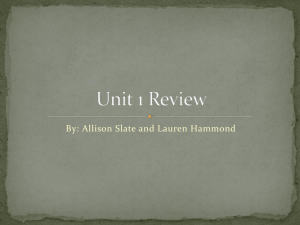Running head: OVERMUCH LOVE 1
advertisement
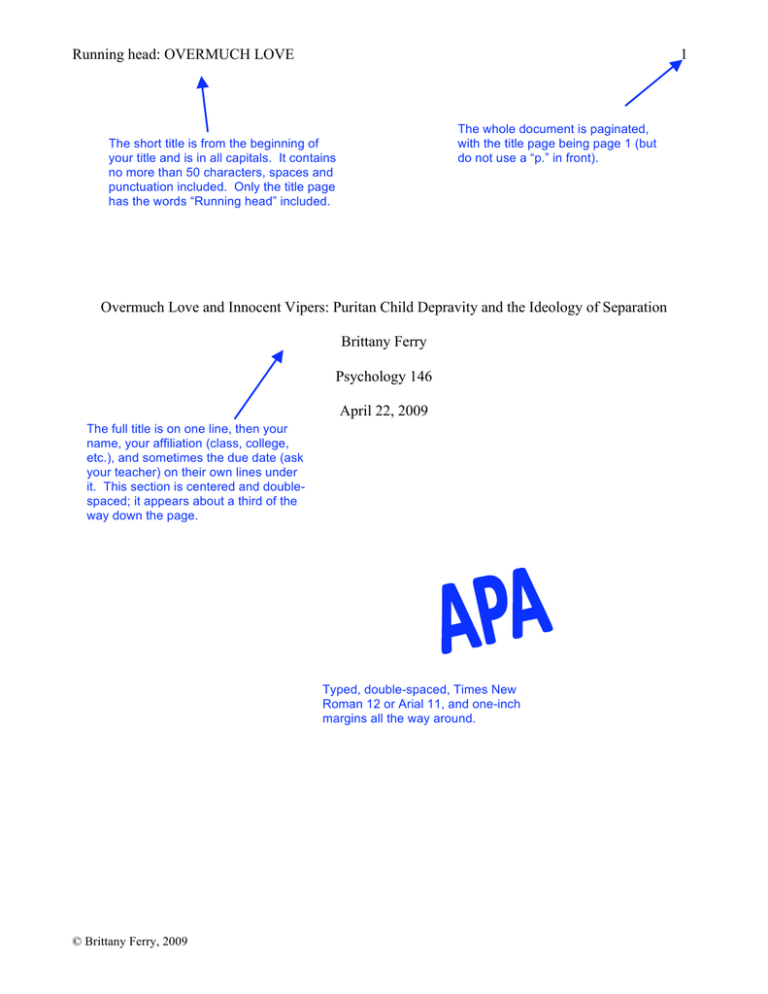
Running head: OVERMUCH LOVE 1 The whole document is paginated, with the title page being page 1 (but do not use a “p.” in front). The short title is from the beginning of your title and is in all capitals. It contains no more than 50 characters, spaces and punctuation included. Only the title page has the words “Running head” included. Overmuch Love and Innocent Vipers: Puritan Child Depravity and the Ideology of Separation Brittany Ferry Psychology 146 April 22, 2009 The full title is on one line, then your name, your affiliation (class, college, etc.), and sometimes the due date (ask your teacher) on their own lines under it. This section is centered and doublespaced; it appears about a third of the way down the page. Typed, double-spaced, Times New Roman 12 or Arial 11, and one-inch margins all the way around. © Brittany Ferry, 2009 OVERMUCH LOVE For citations, use only the last name(s). If you write it directly into the sentence, put the year of publication directly after the name(s), with the page at the end (in the case of direct quotes). Otherwise, put all the information together at the end of the sentence. 2 Title repeats in bold and centered. Overmuch Love and Innocent Vipers: Puritan Child Depravity and the Ideology of Separation Puritans saw the world as wholly polluted with sin, even themselves, and as such, worthy of nothing better than the torments of hell. As Deddes (1981) has pointed out, they were, after all, the “shameful consummation of original sin,” a separation from God’s grace that marked the beginning of a death begun at conception (p. 5). “‘Thou shalt be always dying, dying, till thou art perfectly dead,’ [Samuel] Willard concluded, for ‘the miseries of this life differ not from those that follow, so much for kind, as degree’” (Deddes, 1981, p. 4). Further, hell’s proximity to the physical world meant that Puritans were daily confronted with wicked temptation, Satan’s attempts to turn man’s eyes from God and instill active sin in him. Love of and delight in the transitory physical world was among the worst and easiest of these offenses. Puritans therefore guarded themselves virulently against forming too fond of attachments to anything in this life, which manifested itself culturally as a battle between the When over forty words, For an flesh and the spirit, a metaphor that an anonymous poet captured well: use a block anonymous quote: indent source, use Be still thou unregenerate part, / Disturb no more my setled heart, / For I have vow'd a half-inch, the title in title double space, case. For short (and so will doe) / Thee as a foe, still to pursue. / And combate with thee will and must, / don’t use works like quote marks, articles, use quotation Untill I see thee laid in th' dust. / Sisters we are, yea twins we be, / Yet deadly feud 'twixt maintain original marks; for big spelling, and sources like thee and me. (“The Flesh and the Spirit,” 1988, p. 175–176) move the books, italics. period in front All Puritans understood the deadly feud to which Bradstreet referred, and considered it a lifelong of the parentheses. battle. Birth was not simply the beginning of death; birth began a Puritan’s permanent confrontation with life, a singular journey to repulse the sinful attachments of this world and search for signs of redemption, though man, in his naturally wicked nature, was not worthy of God’s grace and deserved eternal damnation. The Puritan did have an escape from the fiery depths of hell: God’s election. Puritan theology recognized predestination, the idea that God chose to save a select number of souls from hell before © Brittany Ferry, 2010 OVERMUCH LOVE Multiple sources separated by a semi-colon. 3 birth. Thus, technically, the Puritan could do nothing for his own salvation, other than accept God’s will Use single quote and search for signs that he might be among God’s elect (Miller, 1939; Hammond, 2000). marks only for a quote From this idea sprang the covenant of grace, in which man “turned up toward God’s eternal within a quote. Close up the single and double quotes, counsel” and accepted his omnipotence; “the covenant, he [William Perkins] said, is ‘absolutely even if it’s at the same necessary for salvation’” (Pettit & Stannard, 1966, para. 14). Further, Puritan society ordained that spot. Add clarifying info to a quote man had to freely enter the covenant. God chose his elect, but in turn, man had to choose God. with square For websites, brackets. count Puritans socially acknowledged man’s acceptance of God through the conversion experience, which paragraphs, not struck one suddenly—a “heart wrenched from depravity to grace” (Miller, 1939, p. vii)—but man had pages. Pages in to predispose or prepare himself before it could occur. Further, to socially legitimize a conversion Roman numerals work just experience, one had to relate it convincingly to the heads of the church in order to gain church like regular membership. Without membership, a person would not be considered among God’s elect or pages considered a full member of society. Therefore, the conversion experience was a critical part of every Puritan’s life, both socially and spiritually. “The most crucial event in the life of each person was his effectual calling or conversion which turned him once for all from death to life” (Hammond, 2000, p. 36). It was in this way alone, Puritans believed, that man could be saved the horrors of hell and of death. © Brittany Ferry, 2010 OVERMUCH LOVE 4 Include state only if needed. Centered and bold. Use hanging indent. Deddes, Use only initials and the full last name. References G. E. (1981). Welcome joy: Death in Puritan New England. Ann Arbor, MI: UMI Research Press. Articles/poems in sentence case, no quotation marks. Double-space. The flesh and the spirit. (1988). In J. R. McElrath & A. R. Robb (Eds.). The complete works of Puritan Year, then month, then day. poets. Boston: Twayne Publishers. Hammond, J. A. (2000, May 1). The American Puritan elegy: A literary and cultural study. William & Only journal titles are in title case. Mary Quarterly, 48(2), 24–47. Retrieved from JSTOR, http://www.jstor.org.proxy.lib.pdx. edu. Pages without “p.” If the URL is long, name the database and give the root URL. Miller, P. (1939). The New England mind: The seventeenth century. London: Oxford University Press. Capitalize the first letter in title and subtitle and proper nouns. Pettit, N., & Stannard, D. (1966). The heart prepared: Grace and conversion in Puritan spiritual life. Department of History, Yale University. Retrieved from http://www.yale.edu/history/staff/n_ Alphabetize list. pettit/pubs.html. Optional: Use if it lends credibility to the source. Here, the punctuation is exaggerated to make it easy to see; your finished page will not have that. , . . (1981). Welcome joy: Death in Puritan New England. Ann Arbor, MI: UMI Research Press. The flesh and the spirit. (1988). In J. R. McElrath & A. R. Robb (Eds.). The complete works of Puritan poets. Boston: Twayne Publishers. Hammond, J. A. (2000, May 1). The American Puritan elegy: A literary and cultural study. William & Mary Quarterly, 48(2), 24–47. Retrieved from JSTOR, http://www.jstor.org .proxy.lib.pdx.edu. Miller, P. (1939). The New England mind: The seventeenth century. London: Oxford University Press. Pettit, N., & Stannard, D. (1966). The heart prepared: Grace and conversion in Puritan spiritual life. Department of History, Yale University. Retrieved from http://www.yale.edu/history/staff/n_pettit/ pubs.html. Deddes G E © Brittany Ferry, 2010

